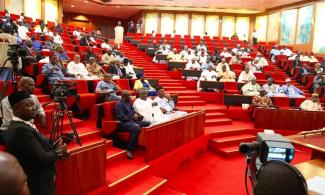
We know it wouldn’t completely be spent on renovating dilapidated hospitals or fixing the interstate highways that consume hundreds of innocent lives annually.
The Senate President and other policymakers are quietly moving forward in their consideration of President Muhammadu Buhari’s ridiculous request to add about ₦1.6 trillion to the already unmanageable external debt stock of ₦13 trillion. The argument from the presidency is that the new loan will be put into sectors like agriculture, health, energy, education, and others. Of course, this is the same story the federal government sells every time it is about to carry its begging bowl to Washington DC or Beijing. Only this time, Nigeria can find what it’s looking for outside, within.

The main story the presidency is selling in this loan request is that Buhari and his Fulani-dominated federal government are so concerned with “poverty reduction as well as protection of the most vulnerable and very poor,” that the loans are of urgent necessity.
But the real questions that the presidency should have answered before submitting the request to Senate President Ahmed Lawan and the rubber-stamp National Assembly are: What happened to the loans Buhari took from China, the World Bank, and other lenders in the last five years? Did Buhari and his aides not promise that these loans would be used to address the same problems the newest loan requested is hoping to address? Or, is it that something happened that made those past loans inefficient in addressing the problem for which they were granted?
Whether or not the presidency chooses to answer these questions, Nigerians know for sure that these new loans would eventually be used for things other than that for which they were requested. We know it wouldn’t completely be spent on renovating dilapidated hospitals or fixing the interstate highways that consume hundreds of innocent lives annually.
The 2023 election is near and the All Progressive’s Congress (APC) has to be ready to push its ‘keep dem poor’ agenda with free money just as it did in 2019. So, Lawan and his APC bedmates can, in advance, keep their justifications for the approval in their pockets. But let’s put the justification question on the side and look at where Buhari plans to get the money.
Late last week, the Honorable Muhammed Kazaure of Jigawa state made a statement that sounds to many as a comic when it indeed speaks to a great degree of concern. Kazaure claimed that Buhari has budgeted over ₦5.1 trillion to service stolen funds that plunged the nation into debts. He instead advises the President to go dig up and retrieve the money stolen and stored illegally across the country by politicians. He thinks this will give the county the money it needs to fund the national budget.
This advice is even more relevant if one considers that the loan request that Buhari sent to the Senate is targeted at funding the budget. But going back to Kazaure’s point, one may ask: where are the funds that the Economic and Financial Crimes Commission claimed to have recovered from corrupt politicians during the one-sided war on corruption? What about the recovered Abacha loot?
One thing that still isn’t clear to many Nigerians is that no loan is free. In good cases, they would have to be serviced with affordable interests for decades. In the worst cases, national assets may be lost if the borrowing county defaults. So, one may wonder, where Buhari is looking to get the loans?
Well, in his letter to the Senate, the presidency listed some usual lenders and a particularly worrisome couple. They are the World Bank, French Development Agency, China-Exim Bank, International Fund for Agricultural Development, Credit Suisse Group, Standard Chartered, and China Export Credit and Insurance Corporation
Looking at the World Bank and the private lenders on the list, there may not be too much of a worry considering Nigeria knows how to deal with them. We simply take loans and just don’t pay them, which eventually have to be forgiven or reduced somehow. But the real problem is with the China Export Credit and Insurance Corporation and the China-Exim Bank. These are agencies of the Chinese state and the ruling communist party.
What’s more worrisome is that most of the loan agreements that these two agencies have had with Nigeria and other African countries in the past are secret. That is, both the borrowed amount and the collateral given to secure the loan are undisclosed. The lesson of Zambia’s loss of some of its national assets to China after defaulting on its loans to Beijing is there for everyone to see. China’s secretive repayment scheme has been a major struggle for the new government in that country.
Nigerians must remember that Buhari will only be in office until 2023. The subsequent administration will then have to deal with repaying all the billions in debt incurred by Buhari and his gluttony government.
But whichever way the Senate considers this loan request, Nigerians should understand two things. First, we can derive funds needed to power the budget by fixing corruption and admonishing public officials to be less extravagant in their spending. Second, Buhari may be selling our future and our children’s future to China with his secretive loan agreement.
This movie has already played out in the past: the rubber-stamp Senate will approve the President’s request, the loans would be secured and mostly embezzled, four years down the line, another President will request more loans to address the same problem. And the neverending cycle continues.
Ibrahim B. Anoba (Bàbátúndé Anọ́ba) is a Nigerian journalist and columnist for Sahara Reporters. He is also an Africa fellow at Atlas Network. He tweets via @Ibrahim_Anoba.